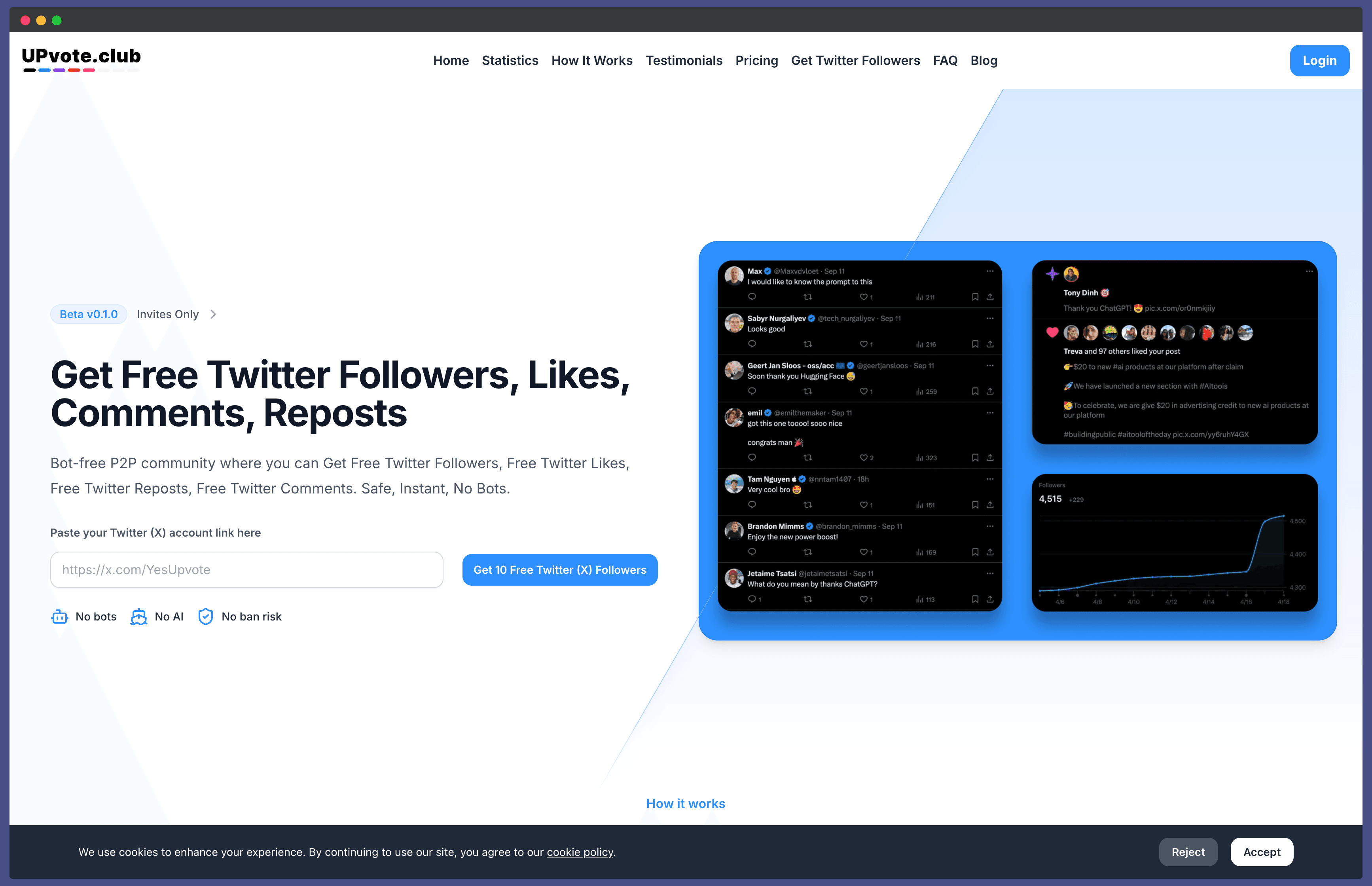How I Built a Twitter-Promotion Web App for Just $60
How I Built a Twitter-Promotion Web App for Just $60
Nov 21, 2024


Alex Ign
Alex Ign
⏳ 6 min
⏳ 6 min
Revenue/month
Revenue/month
$1,000+ (IH verified)
$1,000+ (IH verified)
$1,000+ (IH verified)
No. of founders
No. of founders
1
1
1
Startup costs
Startup costs
$60
$60
$60
Company type
Company type
Company type
SaaS
SaaS
SaaS
Contents
About the founder
About the founder
Hi there! Can you introduce yourself and tell us about the business you started?
Hello everyone, I'm Alex Ign, founder of Upvote club, code market, askpot, and Indie Hacker Manifesto. I've been indie hacking for quite some time, but I didn’t realize it — I didn’t know that’s what it was called.
I tag myself as a digital engineer. In 2018, I created what is probably the most popular Instagram mockup in the world, which eventually sold over 20,000 copies. Back then, I didn’t consider myself an indie hacker or solopreneur.
I simply needed a mockup for my project, started looking for one, couldn’t find exactly what I needed, and decided to make it myself. Now, I’m working on Upvote Club, AskPot, Code market, and recently wrote and published the Indie Hacker Manifesto — a foundational value system to guide anyone choosing the indie hacker path. I also have a couple of interesting products in my idea bank.
(A screenshot of upvote club's landing page)

Hi there! Can you introduce yourself and tell us about the business you started?
Hello everyone, I'm Alex Ign, founder of Upvote club, code market, askpot, and Indie Hacker Manifesto. I've been indie hacking for quite some time, but I didn’t realize it — I didn’t know that’s what it was called.
I tag myself as a digital engineer. In 2018, I created what is probably the most popular Instagram mockup in the world, which eventually sold over 20,000 copies. Back then, I didn’t consider myself an indie hacker or solopreneur.
I simply needed a mockup for my project, started looking for one, couldn’t find exactly what I needed, and decided to make it myself. Now, I’m working on Upvote Club, AskPot, Code market, and recently wrote and published the Indie Hacker Manifesto — a foundational value system to guide anyone choosing the indie hacker path. I also have a couple of interesting products in my idea bank.
(A screenshot of upvote club's landing page)

Coming Up With The Idea
Coming Up With The Idea
Could you share a bit about your background and what led you to pursue this business idea?
Since the age of 16, I’ve been involved in IT products in one way or another. For the past three years, I was a product lead at a very large and famous Global IT company. But I grew tired of corporate culture and left. And started my indie hacking journey again from 0.
My main skill is product development. I approach any product from four levels: philosophical, emotional, functional, and business. At the philosophical layer, I think about why this is needed and what change it can bring.
At the emotional, I try to figure out what emotions my product will give to users. I use every product by myself every day. Next, I think about what it will be — a bot, a website, or an app.
Only then do I consider how much money it could generate. This is my base business idea scoring system. I always choose to create products I personally feel the need for.
For example, Upvote Club: I needed a tool that could promote tweets through engagement. It’s an old mechanic, but surprisingly, no one had applied it to Twitter yet.
After Twitter, I plan to scale it to other social networks because first off all I need this.
Could you share a bit about your background and what led you to pursue this business idea?
Since the age of 16, I’ve been involved in IT products in one way or another. For the past three years, I was a product lead at a very large and famous Global IT company. But I grew tired of corporate culture and left. And started my indie hacking journey again from 0.
My main skill is product development. I approach any product from four levels: philosophical, emotional, functional, and business. At the philosophical layer, I think about why this is needed and what change it can bring.
At the emotional, I try to figure out what emotions my product will give to users. I use every product by myself every day. Next, I think about what it will be — a bot, a website, or an app.
Only then do I consider how much money it could generate. This is my base business idea scoring system. I always choose to create products I personally feel the need for.
For example, Upvote Club: I needed a tool that could promote tweets through engagement. It’s an old mechanic, but surprisingly, no one had applied it to Twitter yet.
After Twitter, I plan to scale it to other social networks because first off all I need this.

















2,678+ people enjoy it
➤ Every week, we dig up stories of how regular people started and grew their businesses—
➤ Plus the marketing hacks that won them customers.
➤ Then, we share those insights with you.
➤ Every week, we dig up stories of how regular people started and grew their businesses—
➤ Plus the marketing hacks that won them customers.
➤ Then, we share those insights with you.
Creating The Initial Product
Creating The Initial Product
What was it like designing and creating your first product? Can you share some of the early challenges you faced?
The main challenge everyone faces, including myself, is figuring out how to get the first customers and traffic. The answer to this question depends on your go-to-market strategy. What do you prefer? SEO, paid traffic, personal branding on social networks, crowd marketing, content marketing, etc.?
Once you go through this process for the first time, it becomes much easier. If you’re unsure where to start, begin with something simple: write an article on Medium, publish your first post on Reddit, share a LinkedIn post about your product, or tweet about it.
The key is to identify where your audience is and what they engage with, then focus on that. When I launched the Instagram mockup, I started by posting it on Dribbble and Behance. My products initially showed up at the bottom of the feed, so I needed to boost their visibility.
To do this, I purchased likes to push my products to the top. In fact, this is exactly why I created Upvote Club — to help people promote their Twitter posts using a similar mechanic.
Don’t worry. Once you go through the go-to-market journey, it will become much easier, and you’ll unlock a valuable new skill.
What was it like designing and creating your first product? Can you share some of the early challenges you faced?
The main challenge everyone faces, including myself, is figuring out how to get the first customers and traffic. The answer to this question depends on your go-to-market strategy. What do you prefer? SEO, paid traffic, personal branding on social networks, crowd marketing, content marketing, etc.?
Once you go through this process for the first time, it becomes much easier. If you’re unsure where to start, begin with something simple: write an article on Medium, publish your first post on Reddit, share a LinkedIn post about your product, or tweet about it.
The key is to identify where your audience is and what they engage with, then focus on that. When I launched the Instagram mockup, I started by posting it on Dribbble and Behance. My products initially showed up at the bottom of the feed, so I needed to boost their visibility.
To do this, I purchased likes to push my products to the top. In fact, this is exactly why I created Upvote Club — to help people promote their Twitter posts using a similar mechanic.
Don’t worry. Once you go through the go-to-market journey, it will become much easier, and you’ll unlock a valuable new skill.
Starting costs + MRR
Starting costs + MRR
What were your starting costs for this business?
I started Upvote Club with just $60, which I spent on a cursor, plus $15 for Heroku, and that was enough. I never buy paid ads for my products. If a product needs paid advertising to succeed, it means it won’t survive because people aren’t spreading the word about it organically.
What's your current MRR(monthly recurring revenue)
I don’t like talking about money. To me, it’s the least interesting way to share results. I know it’s the main hook in the indie hacker community — mention how much you’re making per month, and people will listen.
But I’m simply not interested in using that approach to communicate. It’s far more engaging to talk about my products through other numbers, like key metrics.
For example, in Upvote Club, I share the number of completed tasks every week. This metric is not only important to me but also to the community.
What were your starting costs for this business?
I started Upvote Club with just $60, which I spent on a cursor, plus $15 for Heroku, and that was enough. I never buy paid ads for my products. If a product needs paid advertising to succeed, it means it won’t survive because people aren’t spreading the word about it organically.
What's your current MRR(monthly recurring revenue)
I don’t like talking about money. To me, it’s the least interesting way to share results. I know it’s the main hook in the indie hacker community — mention how much you’re making per month, and people will listen.
But I’m simply not interested in using that approach to communicate. It’s far more engaging to talk about my products through other numbers, like key metrics.
For example, in Upvote Club, I share the number of completed tasks every week. This metric is not only important to me but also to the community.
Planning + Execution
Planning + Execution
How did you plan and execute the initial launch of your business? What strategies did you rely on?
I choose to create only painkiller products. This is a part of my strategy. My strategy is to avoid raising investments entirely. When money enters a product — no matter how small the stake — it inevitably shifts priorities.
That’s why I focus on creating painkillers. That’s why I don’t make vitamins or dopamine products. Vitamins are very hard to sell, and dopamine products are very difficult to build and require significant investment.
The second part of my strategy is virality. Virality occurs when people feel compelled to share and promote your product through word of mouth, and they’ll want to share it when it delivers a “wow” effect.
The wow effect consists of two key elements: speed and accuracy. Speed refers to how quickly the product solves the user’s problem, and accuracy refers to how precisely it addresses their pain point. If you’re both fast and accurate, you can be confident that people will share your product.
Furthermore, the pain points your product addresses should occur frequently. Take Upvote Club, for example — every time someone publishes a post, they want to promote it so it doesn’t get stuck with a small number of views.
How did you plan and execute the initial launch of your business? What strategies did you rely on?
I choose to create only painkiller products. This is a part of my strategy. My strategy is to avoid raising investments entirely. When money enters a product — no matter how small the stake — it inevitably shifts priorities.
That’s why I focus on creating painkillers. That’s why I don’t make vitamins or dopamine products. Vitamins are very hard to sell, and dopamine products are very difficult to build and require significant investment.
The second part of my strategy is virality. Virality occurs when people feel compelled to share and promote your product through word of mouth, and they’ll want to share it when it delivers a “wow” effect.
The wow effect consists of two key elements: speed and accuracy. Speed refers to how quickly the product solves the user’s problem, and accuracy refers to how precisely it addresses their pain point. If you’re both fast and accurate, you can be confident that people will share your product.
Furthermore, the pain points your product addresses should occur frequently. Take Upvote Club, for example — every time someone publishes a post, they want to promote it so it doesn’t get stuck with a small number of views.
Pricing Strategies
Pricing Strategies
What pricing strategies worked best for your business?
I always use trials in my products. It's important to me that the user can test the product and get a 'wow effect' already at the trial level. I've experimented with trials for a long time and noticed that when they're absent, sales are on average 50% lower, so I use trials almost everywhere. And then it's the classic approach - 3 price tiers, etc.
What pricing strategies worked best for your business?
I always use trials in my products. It's important to me that the user can test the product and get a 'wow effect' already at the trial level. I've experimented with trials for a long time and noticed that when they're absent, sales are on average 50% lower, so I use trials almost everywhere. And then it's the classic approach - 3 price tiers, etc.
Customer Acquisition
Customer Acquisition
Since you launched, what have been the most effective ways to bring in and keep your customers?
The most effective marketing method is word of mouth. This is what I wrote above - Focus on user experience, as this is why people share your product with others. This thing really works and is powerful.
When 1 user tells their friend, you'll only grow by +1, but when 100 do it, you'll grow by +100 at once. Imagine if a million do this. That's why word of mouth is the only thing I believe you should focus on when creating a product. Think about how likely it is that this will happen with my product.
I am not using the strategy of selling my face on social networks. As an indie hacker, I lack the time to create daily content, so I only write about what truly interests me. I created upvote club for a specific reason: I write 2-3 posts each week, but hardly anyone sees them on Twitter. It's really important to me that my work becomes visible, so I needed a tool to help promote my posts.
Retention is important, and it's created by how quickly a person gets what they came for and how precisely your product solves their pain point. If this happens quickly, qualitatively, and accurately, be sure they'll return to you. And yes, chase the churn.
Since you launched, what have been the most effective ways to bring in and keep your customers?
The most effective marketing method is word of mouth. This is what I wrote above - Focus on user experience, as this is why people share your product with others. This thing really works and is powerful.
When 1 user tells their friend, you'll only grow by +1, but when 100 do it, you'll grow by +100 at once. Imagine if a million do this. That's why word of mouth is the only thing I believe you should focus on when creating a product. Think about how likely it is that this will happen with my product.
I am not using the strategy of selling my face on social networks. As an indie hacker, I lack the time to create daily content, so I only write about what truly interests me. I created upvote club for a specific reason: I write 2-3 posts each week, but hardly anyone sees them on Twitter. It's really important to me that my work becomes visible, so I needed a tool to help promote my posts.
Retention is important, and it's created by how quickly a person gets what they came for and how precisely your product solves their pain point. If this happens quickly, qualitatively, and accurately, be sure they'll return to you. And yes, chase the churn.
The Future Of The Business
The Future Of The Business
How are things going currently, and what are your goals for the future of your business?
Great question. A year ago, I saw an interview with Sam Altman where he said we'll soon see a billion-dollar company created by a single person using AI, and I thought, 'Why not try?' Since then, I've made this my goal. A billion-dollar capitalization solo. Right now, I'm very far from it, but I believe it's possible.
How are things going currently, and what are your goals for the future of your business?
Great question. A year ago, I saw an interview with Sam Altman where he said we'll soon see a billion-dollar company created by a single person using AI, and I thought, 'Why not try?' Since then, I've made this my goal. A billion-dollar capitalization solo. Right now, I'm very far from it, but I believe it's possible.
Lessons Learned
Lessons Learned
What has been one of the most valuable lessons you've learned through this journey so far?
5 Lessons:
1. The smaller you are, the more you need to narrow your focus. 1 product, 1 marketing channel, 1 audience, 1 message, 1 offer.
2. Where attention goes, results follow. Whatever you spend more time on grows - spend time on marketing — traffic increases; spend time on the product — the product improves; spend time on coding — code quality increases.
3. Don't engage in something that doesn't interest you - if you force yourself, you won't last long.
4. Play without expectations, no expectations from your actions, just play and win.
5. Victories are very important, failures don't matter.
What has been one of the most valuable lessons you've learned through this journey so far?
5 Lessons:
1. The smaller you are, the more you need to narrow your focus. 1 product, 1 marketing channel, 1 audience, 1 message, 1 offer.
2. Where attention goes, results follow. Whatever you spend more time on grows - spend time on marketing — traffic increases; spend time on the product — the product improves; spend time on coding — code quality increases.
3. Don't engage in something that doesn't interest you - if you force yourself, you won't last long.
4. Play without expectations, no expectations from your actions, just play and win.
5. Victories are very important, failures don't matter.
Boost your business visibility to thousands of engaged readers!
Get Featured on 100+ pages across the FounderNoon website.
One month stretch ⇢ $100
Three-month stretch ⇢ $250
Boost your business visibility to thousands of engaged readers!
Get Featured on 100+ pages across the FounderNoon website.
One month stretch ⇢ $100
Three-month stretch ⇢ $250
Tools Used To Run The Business
Tools Used To Run The Business
Which tools or platforms have been essential to running your business smoothly?
Here I won't be original. Product and development: askpot for competitor analysis, Figma, Framer, Cursor, Claude Sonnet, Heroku, Python, React+Next, Vercel, v0.
Marketing: upvote club for promotion, code market for stable traffic to products, SemRush, Google Search Console, Twitter, IndieHackers, Reddit, Fiverr, and Medium.
Which tools or platforms have been essential to running your business smoothly?
Here I won't be original. Product and development: askpot for competitor analysis, Figma, Framer, Cursor, Claude Sonnet, Heroku, Python, React+Next, Vercel, v0.
Marketing: upvote club for promotion, code market for stable traffic to products, SemRush, Google Search Console, Twitter, IndieHackers, Reddit, Fiverr, and Medium.
Resource Recommendations
Resource Recommendations
Have there been any books, podcasts, or other resources that have influenced your approach?
Lately, I've been reading psychology books - this topic interests me now. One of my favorite books is Phil Knight's "Shoe Dog". I watch Friedman's podcasts, and sometimes Joe Rogan's.
Have there been any books, podcasts, or other resources that have influenced your approach?
Lately, I've been reading psychology books - this topic interests me now. One of my favorite books is Phil Knight's "Shoe Dog". I watch Friedman's podcasts, and sometimes Joe Rogan's.
Advice For Aspiring Entrepreneurs
Advice For Aspiring Entrepreneurs
What advice would you give to someone just starting out or considering launching their own business?
Three things are important: what, when, and for whom you're doing it.
All three components matter. The market is not the product, the market is people. Think about it like this. For example, the iPhone market isn't the phones themselves, but the people who can and want to buy them. The higher the entry barrier, the fewer competitors you'll have, but the longer it will take you to enter.
Making big products is just as difficult as making small ones. Do what you can sell. Think about virality - your product should advertise itself.
What advice would you give to someone just starting out or considering launching their own business?
Three things are important: what, when, and for whom you're doing it.
All three components matter. The market is not the product, the market is people. Think about it like this. For example, the iPhone market isn't the phones themselves, but the people who can and want to buy them. The higher the entry barrier, the fewer competitors you'll have, but the longer it will take you to enter.
Making big products is just as difficult as making small ones. Do what you can sell. Think about virality - your product should advertise itself.







